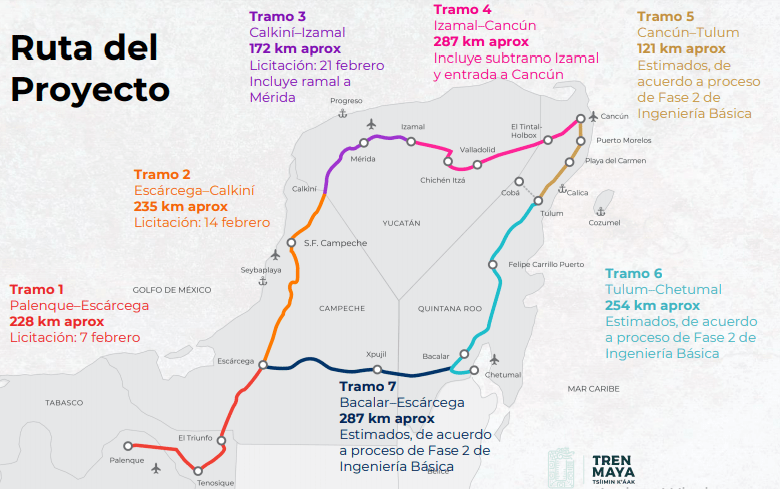The Maya Train, a flagship project of the current federal government of Mexico, had a total accumulated physical progress of 13.67% as of May 2021, according to data from the Ministry of Finance and Public Credit (SHCP).
In addition to being a tourist train service, the Mayan Train would also be used to transport certain goods.
In general, the train would connect Palenque in Chiapas with a route that circles the Yucatán Peninsula and would connect Escárcega and the city of Campeche, in Campeche, with the cities of Mérida and Valladolid, in Yucatán, and then with the cities of Cancún, Playa del Carmen, Tulum and Chetumal, in Quintana Roo.
The train would also connect the largest Mayan archaeological site in the region, called Calakmúl.
The entire railway line of approximately 1,440 km.
In total, the Mayan Train has programmed an investment amount of 161,356.4 million pesos and an accumulated exercised amount of 19,052.2 million pesos.
In addition, the Mayan Train project consists of providing the transportation service that will interconnect the main cities and tourist areas of the Yucatan Peninsula, which aims to promote the socioeconomic development of the region and local communities, strengthen the industry tourism in Mexico, promote social inclusion and job creation.
Maya Train
The main components of the project are:
– Railroad construction.
– Rolling stock equipment.
– Installation of signaling, telecommunications and security systems.
– Station construction.
– Operation for the provision of passenger and cargo service.
The construction of the first section of the Mayan Train, which runs from Palenque to Escárcega, would conclude in 2023.
The investment amount programmed for 2021 is 112,514.9 million pesos.
Likewise, the advance scheduled for the end of 2021 is 26.09 percent.
On the public works side, most of the projects of the National Development Plan, such as the Mayan Train, have gone from being planned as public-private partnerships (PPPs) to being financed mainly by the government.
For those projects that involve PPP financing, including some of the package led by the private sector, the Public-Private Partnerships Law allows the government to enter into infrastructure and service provision contracts with private companies for up to 40 years.
This law provides more legal security to private investors by distributing risk more equitably, facilitating access to bank loans, and harmonizing existing state public partnership models in a federal law.
![]()

